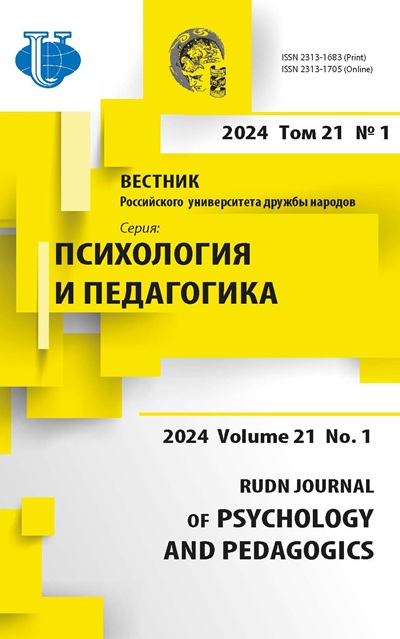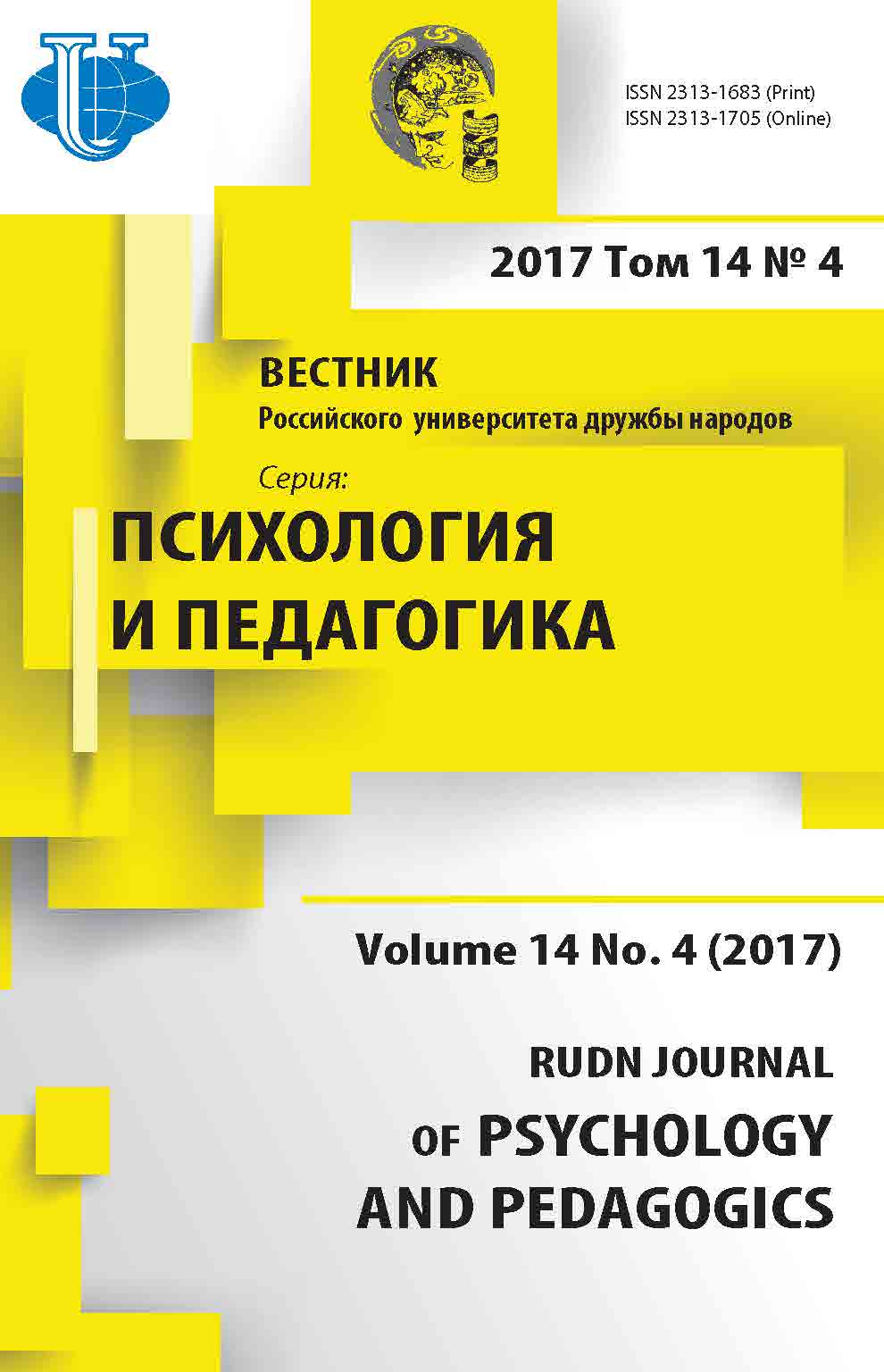WAY OF MAINTAINING THE SELF-RESPECT AS PREDICTOR OF LIFE SATISFACTION, ACADEMIC MOTIVATION AND PERSISTENCE IN ADOLESCENTS
- Authors: Gordeeva T.O1, Lunkina M.V1
-
Affiliations:
- Lomonosov Moscow State University
- Issue: Vol 14, No 4 (2017)
- Pages: 413-426
- Section: Articles
- URL: https://journals.rudn.ru/psychology-pedagogics/article/view/17256
- DOI: https://doi.org/10.22363/2313-1683-2017-14-4-413-426
Cite item
Full Text
Abstract
The article deals with the problem of healthy contingencies of self-respect (self-respect based on own achievements and competence and self-respect based on others’ acceptance) and neurotic contingencies of self-respect based on “pseudo-achievements”. According to A. Maslow’s theory of motivation, these two types of self-respect are expected to have different consequences for the psychological and school well-being of schoolchildren. The results showed that self-respect based on one’s own competence, efforts, and achievements predicted psychological well-being, intrinsic and autonomous academic motivation, and persistence. Self-respect based on others’ acceptance (approval) predicted only the motivation based on respect from parents and did not predict psychological well-being and persistence. Self-respect based on pseudo-achievements predicted external motivation and negatively predicted academic persistence (grit). The obtained results can serve as a basis for development of trainings which promote healthy self-respect by facilitation of personal competence development, constructive thinking, and ability to cope with difficult situations.
About the authors
Tamara O Gordeeva
Lomonosov Moscow State University
Author for correspondence.
Email: tamgordeeva@gmail.com
Tamara O. Gordeeva - Doctor of Psychology, Associate Professor, Associate Professor of the Department of Educational Psychology and Pedagogy of the Faculty of Psychology of Lomonosov Moscow State University (Moscow, Russia).
Mokhovaya str., 11 (Bld. 9), Moscow, Russia, 125009Maria V Lunkina
Lomonosov Moscow State University
Email: marusamendelevich@gmail.com
Maria V. Lunkina - Postgraduate student of the Department of Educational Psychology and Pedagogy of the Faculty of Psychology of Lomonosov Moscow State University (Moscow, Russia).
Mokhovaya str., 11 (Bld. 9), Moscow, Russia, 125009References
- Baumeister, R.F., Campbell, J.D., Krueger, J.I., & Vohs, K.D. (2003). Does high self-esteem cause better performance, interpersonal success, happiness, or healthier lifestyles? Psychological science in public interest, 4(1), 1—44. doi: 10.22363/2313-1683-2017-14-4: 10.1111/1529-1006.01431
- Bodalev, A.A., & Stolin, V.V. (Eds). (1987). Psihologicheskaja diagnostika. Moscow: MSU Publ. (In Russ.).
- Cheng-Hong, L., Yi-Hsing, C.C., & Jen-Ho, C. (2017). Why do easterners have lower well-being than westerners? The role of others’ approval contingencies of self-worth in the cross-cultural differences in subjective well-being. Journal of Cross-Cultural Psychology, 48(2), 217—224. doi: 10.22363/2313-1683-2017-14-4: 10.1177/0022022116677580
- Crocker, J., & Luhtanen, R.K. (2003). Level of self-esteem and contingencies of self-worth: Unique effects on academic, social, and financial problems in college freshmen. Personality and Social Psychology Bulletin, 29, 701—712. doi: 10.22363/2313-1683-2017-14-4: 10.1177/0146167203029006003
- Crocker, J., & Wolfe, C. (2001). Contingencies of Self-Worth. Personality and Social Psychology Review, 108(3), 593—623. doi: 10.22363/2313-1683-2017-14-4: 10.1037/0033-295x.108.3.593
- Crocker, J., Luhtanen, R., Cooper, M.L., & Bouvrette, S.A. (2003). Contingencies of self-worth in college students: Measurement and theory. Journal of Personality and Social Psychology, (85), 894—908. doi: 10.22363/2313-1683-2017-14-4: 10.1037/0022-35.14.85.5.894
- Deci, E., Ryan, R. (Eds). (2002). Handbook of Self-Determination Research. University of Rochester Press.
- Gizhickii, V.V., Gordeeva, T.O., & Gavrichenkova, T.K. (2015). Razrabotka oprosnika uchebnoj nastojchivosti i postojanstva uchebnyh interesov. Sovremennaja psihodiagnostika Rossii. Preodolenie krizisa. Conference Proseedings (vol. 1, pp. 66—74). Chelyabinsk: Publishing Center of SUSU. (In Russ.).
- Gordeeva, T.O., Sychev, O.A, Gizhickii, V.V., & Gavrichenkova, T.K. (2016). Motivation of Self-Respect and Respect by Others as Factors of Academic Achievements and Persistence in Educational Activity. Psihologicheskij zhurnal, 37(2), 57—68. (In Russ.).
- Gordeeva, T.O., Sychev, O.A., Gizhickii, V.V., & Gavrichenkova, T.K. (2017). Intrinsic and Extrinsic Academic Motivation Scale for Schoolchildren. Psychological Science and Education, 22(2), 65—74. doi: 10.22363/2313-1683-2017-14-4: 10.17759/pse.2017220206 (In Russ.).
- Greenberg, J., Solomon, S., Pyszczynski, T., Rosenblatt, A., Burling, J., Lyon D., Pinel, E., & Simon, L. (1992). Assessing the terror management analysis of self-esteem: Converging evidence of an anxiety buffering function. Journal of Personality and Social Psychology, 63, 913—922. doi: 10.22363/2313-1683-2017-14-4: 10.1037/0022-3514.63.6.913
- Luhtanen, R.K., & Crocker, J. (2005). Alcohol use in college students: Effects of level of self-esteem, narcissism, and contingencies of self-worth. Psychology of Addictive Behaviors, 19, 99—103. doi: 10.22363/2313-1683-2017-14-4: 10.1037/0893-167x.19.1.99
- Maslow, A.H. (1943). A Theory of Human Motivation. Psychological Review, 50(4), 370—396. doi: 10.22363/2313-1683-2017-14-4: 10.1037/h0054346
- Mecca, A.M., Smelser, N.J., & Vasconcellos, J. (1989). The Social Importance of Self-Esteem. Berkeley: University of California Press. doi: 10.22363/2313-1683-2017-14-4:10.1093/sf/69.3.974
- Molchanova, O.N., & Nekrasova, T.Yu. (2013). Adaptation of J. Crocker’s Contingencies of Self-Worth Scale. Cultural-Historical Psychology, (4), 65—74. doi: 10.22363/2313-1683-2017-14-4:10.17759/chp.2015110402 (In Russ.).
- Sowislo, J.F., & Orth, U. (2013). Does low self-esteem predict depression and anxiety? A meta-analysis of longitudinal studies. Psychological Bulletin, 139, 213—240. doi: 10.22363/2313-1683-2017-14-4: 10.1037/a 0028931
- White, R. (1959). Motivation reconsidered: The concept of competence. Psychological Review, 66, 297—333. doi: 10.22363/2313-1683-2017-14-4: 10.1037/h0040934
















